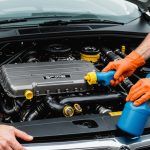Maintaining your vehicle’s engine is essential for optimal performance and longevity. One of the most effective ways to ensure your engine runs smoothly is by using engine cleaning products. These products help to remove deposits, grime, and other contaminants that accumulate over time, impacting the engine’s efficiency. In this guide, we will explore how to effectively use UK vehicle engine cleaner products to enhance your car’s performance, increase fuel efficiency, and prolong the life of your engine.
Understanding Engine Cleaning Products
Before delving into how to use engine cleaning products, it’s crucial to understand what these products are and how they function. Engine cleaners come in various forms, including additives that you mix with your fuel or oil, and dedicated cleaning solutions used during maintenance. Each type of product serves a specific purpose and utilizes ingredients designed to break down carbon build-up, oil sludge, and other deposits that can hinder engine performance.
Also to read : Essential Tips for Spark Plug Replacement in High-Performance British Engines: Achieve Peak Performance
Most cleaning products are formulated with powerful chemicals that target dirt and grime. Some products even contain moly (molybdenum) additives, which help to reduce friction between moving parts, enhancing overall engine efficiency. When you select a product, consider the specific needs of your vehicle and the type of deposits you aim to remove. For example, if you’re primarily dealing with carbon deposits, look for a cleaner specifically designed for that purpose.
Using these products correctly can greatly impact your vehicle’s fuel efficiency and performance. Regular cleaning ensures your engine remains in top shape, allowing for smoother operation and less wear over time. Understanding the ingredients and intended use of each product will help you choose the right cleaner for your vehicle. This knowledge also empowers you to make informed decisions on when and how to apply these products for maximum benefit.
Also to read : Step-by-Step Guide to Adding a Rear-Seat Entertainment System in Your British Family Car
Preparing Your Vehicle for Cleaning
Before using any engine cleaning product, you must prepare your vehicle properly. Preparation ensures that you get the best results from the cleaning process and helps prevent any potential damage to the engine. Start by gathering all necessary tools and materials. You will need the engine cleaning product of your choice, basic cleaning supplies, and a safe working environment.
Begin by ensuring the engine is cool. Cleaning a hot engine can be dangerous and may lead to burns or other injuries. Once the engine has cooled, locate the oil filler cap and the air intake. These areas are critical when using most cleaning products, especially those designed to be added to oil or fuel.
Next, check the owner’s manual for specific instructions related to your vehicle model. Some vehicles may have unique requirements for engine cleaning. If your product is an additive, read the label carefully to determine the correct dosage based on your engine size. Mixing too much product can cause issues, while not enough may result in ineffective cleaning.
After confirming that your vehicle is ready, spend a few minutes inspecting the engine for obvious signs of trouble, such as oil leaks or corrosion. Taking notes will help you track your vehicle’s condition over time and assess the effectiveness of the cleaning once you’ve completed the process.
Applying Engine Cleaner Products
Once your vehicle is prepared, it’s time to apply the engine cleaner products. The application process can vary based on the type of product you are using. If you are using a fuel additive, the process is relatively straightforward: simply add the recommended amount to your fuel tank before filling up. Running the engine for a while after adding the product will help circulate it through the fuel system, ensuring optimal cleaning of fuel injectors and combustion chambers.
For oil-based cleaners, the steps are similar. Remove the oil filler cap and pour the appropriate amount of cleaner directly into the engine oil. After adding the cleaner, run the engine for a specified period, usually around 15 to 30 minutes, to allow the product to circulate. This action helps to dissolve sludge and grime that could affect engine operation.
If you opt for a more comprehensive detailing solution involving manual cleaning, you may need to remove certain parts of the engine cover to reach specific components. Use a spray cleaner for targeted areas, focusing on dirty components like the throttle body and intake manifold. Allow the cleaner to sit for a few minutes to break down tough deposits, then scrub or wipe away with a clean cloth.
After applying any cleaner, remember to check for leaks or unusual noises as the engine runs. This vigilance will help you identify any issues early on. Once the cleaning process is complete, it’s essential to dispose of any used cleaners or residues properly, adhering to local regulations to protect the environment.
Post-Cleaning Maintenance Tips
After using your chosen engine cleaner, consider adopting a regular maintenance schedule to ensure that your vehicle remains in optimal condition. Regular cleaning not only enhances performance but also helps to prevent future buildup of deposits. Depending on your driving habits, you might want to clean your engine every 6 months or after every 5,000 miles.
In addition to regular cleaning, consider using high-quality fuel and oil products to further enhance engine performance. Fuels with additives designed to keep the engine clean can complement your cleaning efforts. Similarly, choosing synthetic oil can help reduce deposit formation and prolong engine life.
Moreover, keep an eye on your vehicle’s performance metrics such as fuel efficiency and engine response. Addressing issues early can prevent more extensive damage and costly repairs down the line. You might also want to develop a relationship with a trusted mechanic who can provide insights and assistance with more complex cleaning and maintenance tasks.
Lastly, educate yourself continuously about the best practices for vehicle maintenance. Joining automotive communities, reading up on industry publications, and attending local workshops can equip you with the knowledge needed to keep your vehicle running smoothly. Remember, a well-maintained engine not only performs better but also significantly adds to the longevity of your vehicle.
Using UK vehicle engine cleaner products effectively can lead to significant improvements in your car’s performance and lifespan. By understanding the different types of products available, preparing your vehicle correctly, applying cleaners appropriately, and maintaining a regular cleaning schedule, you can ensure that your engine remains clean and efficient. Ultimately, investing time in engine maintenance pays off in the long run, resulting in smoother rides and fewer repair bills. Commit to taking care of your engine, and it will reward you with reliable performance for years to come.











